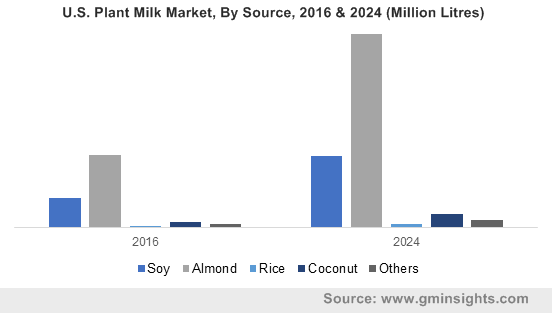Plant milk market to gain widespread acceptance over 2017-2024 as dairy milk witnesses a marked decline in sales
Publisher : Fractovia | Published Date : 2017-12-13Request Sample
Plant milk market size has registered an impressive growth since the last decade, as the popularity of plant milks such as soy milk, coconut milk, almond milk, cashew milk and others, extracted from a variety of grains, nuts and legumes has been rising exponentially. The growing trends of veganism, negative health effects of hormones present in dairy milk, and the rising prevalence of lactose intolerance have emerged as some of the driving forces that have contributed to the phenomenon of patrons shifting base from consuming dairy milk to plant milk. Driven by their massive benefits, the launch of dairy alternatives has risen by 20% between 2012 and 2016.
U.S. Plant Milk Market, By Source, 2016 & 2024 (Million Litres)

The health benefits of drinking dairy milk were popularized since the beginning of the 20th century. Dairy milk, however, has been deemed unsuitable for many – perhaps this is one of the many factors for the evolution of plant milk market. At a time when dairy milk demand rose to a peak, cows were turned into milk yielding machines through various unnatural processes that led to a number of production related diseases in cows - udder infection or mastitis and lameness among which were most common. Cows had also been genetically manipulated and injected with many high milk yielding hormones, that resulted in dairy milk becoming an alarming cocktail of progesterone, cortisone, estrogen, leptin, prolactin etc., which are ideally not supposed to be consumed by humans. As awareness about the downsides of consuming dairy milk had begun to make rounds, consumers, mainly concerned parents and health enthusiasts, shunned dairy milk in favor of plant milk. ProVeg, an international organization dedicated to increase food awareness and decrease the planet’s meat consumption, has stated that the dairy industry "is in crisis". This trend has been noted in UK as the number of dairy farms have gone down from 13,000 to 9,500 in a decade and is estimated to be around 5,000 by 2025. Consequently, what has been lost by the dairy industry has helped the plant milk market evolve as a niche vertical. In fact, the expansion of plant milk industry is inherently noteworthy from the fact that leading dairy manufacturers such as Elmhurst Dairy in Queens, New York, have ceased to produce dairy milk and have shifted to manufacturing a range plant-based milks, thereby establishing their stance in plant milk market.
Plant milk is obtained from numerous sources - soy, coconut, almond, cashew, rice, oats, hazelnut and walnuts, though soy, almond, coconut and rice essentially form the source landscape of plant milk market. Soy in fact, has been the oldest option available when it comes to choosing dairy milk alternatives – as per estimates, soy-based plant milk market size is projected to be over USD 8 billion by 2024. Alternatively though, plant milk industry share from coconut milk and almond milk has also witnessed steady growth, given the rising consumer demands for more alternatives and a wider variety of flavors. Coconut-based plant milk market has been projected to witness a 13% CAGR over 2017-2024, driven by the demand of lauric acid present in coconuts that helps in lowering blood pressure and controlling cholesterol levels and the fact that coconut milk helps in weight loss, improves digestion and controls blood sugar levels. It has been observed that plant milk industry has lately been attracting a wide spectrum of consumers, as these basic sources are being made compatible to be consumed with coffee or cereals. Furthermore, they are also made available in different flavors like strawberry, peppermint, vanilla and chocolate, which has considerably increased the popularity of plant milk market.
The increasing awareness regarding health and empathy toward animals has led to plant milk market registering substantial growth in North America. Estimates claim that this region accounted for 25% of the overall plant milk market share in 2016. Furthermore, health issues arising from the usage of bovine growth hormones has prompted the governments of countries like Canada, Australia, Israel, the European Union, Japan and New Zealand to ban the use of such hormones. This regulation has hit the dairy milk market of these countries and has indirectly boosted plant milk market. Lactose intolerance, milk allergy and more compassionate food choices are also common factors that are making urbanized and mindful customers choose alternative milk sources, which has led to analysts projecting plant milk market to surpass 10 billion liters by 2024.
It is prudent to mention that plant based milks also come with certain drawbacks that have not entirely escaped controversy. It has been pointed out in some analytical reports that the actual nut content in nut based plant milks is as low as 2 percent. Plant based milks are not as nutrient rich as dairy milk and is not recommended for growing children who need nutrient rich diets rather than low fat ones. However, leading plant milk industry players have not been deterred by these minor drawbacks, and have in fact, come up with new products with more basic ingredients and healthier aseptic packaging. These products contain more of the fundamental ingredients, be it legumes, nuts or grains and contain less emulsifiers and thickeners. For instance, almond milk has been criticized severely, as too much water is required to produce a single nut. However, continual R&D activities by plant milk industry experts have helped decrease the amount of water required to cultivate a pound of Californian nuts by 33%. Plant milk market will thus continue to maintain a projectile growth graph as consumers are expected to lean toward a more ecofriendly means of attaining good health through natural food sources with less chemicals involved.